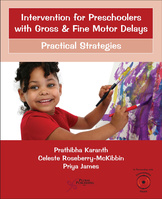Publication

Intervention for Preschoolers with Gross and Fine Motor Delays
Practical Strategies
- Details:
- 280 pages, Illustrated (B/W), Softcover, 8.5 x 11"
- ISBN13:
- 978-1-59756-976-7
- Release Date:
- 05/19/2017
Overview
Intervention for Preschoolers with Gross and Fine Motor Delays: Practical Strategies was created out of concern for the increasing number of children identified with developmental language disorders, including those with autism spectrum disorder, and the lack of adequate resources for them. This manual addresses gross and fine motor skills, as well as activities of daily living (ADLs) for preschoolers between the ages of 3 and 6 years. Children with developmental disabilities often have difficulties in or uneven development of gross and fine motor skills. These delays have a related effect on the acquisition of daily life skills. The activities in this manual for building gross motor, fine motor, and ADL skills encourage sensory stimulation. Sensory integration skills, or a child's ability to integrate sensory stimulation from his or her environment, are automatically targeted in the activities. The activities can be used in a wide variety of settings. They can be used in the therapy rooms of speech-language pathologists (SLPs), preschool classrooms, daycare settings, and children's homes. The activities are especially ideal for professionals who conduct home visits to provide intervention in children's natural, daily settings.
This manual is intended to guide the therapist or caregiver in selecting the target skills that a child should be trained in. The lesson plans outline the activities that need to be undertaken to elicit specific responses from children and establish a range of developmental skills. The simple lesson plans are intended to get the therapist or caregiver started on the process of stimulating the children in each of the domains that they need help in, at their current level of functioning. The first section of this manual addresses the basic gross motor skills that children acquire. For instance, during the ages of 3 to 6 years, the child learns to hop, swing, climb, cycle, throw, and catch with increasing independence. The second section deals with fine motor skill development. The lesson plans included here sensitize the therapist or caregiver to the basic fine motor skills that a child needs to learn at this stage. The third section addresses mastering the activities of daily living. The lesson plans that are included in this section are designed to help the child progressively take care of basic needs with increasing independence.
Also included are "Tech Tips" with recommended YouTube videos, websites, Pinterest sites, and other online resources. These online resources provide the therapist or caregiver with excellent ideas for products and practical intervention strategies that can be used for a variety of purposes when serving young children with special needs.
Background and Introduction
Directions for Use
Motor Skills (Gross and Fine) and Activities of Daily Living
Do's and Don'ts
Acknowledgments
Project Team
Lesson Plans
Part I. Gross Motor Skills
Part II. Fine Motor Skills
Part III. Activities of Daily Living
Conclusion
Glossary
Appendix I. Online Resources for Practical Products and Intervention Strategies
Appendix II. Getting Students on Target With Handwriting by Enhancing Fine Motor Skills
About The Authors
Prathibha Karanth, PhD, received her MSc (1971) and PhD (1981) from the All India Institute of Speech & Hearing (AIISH) in India. For 25 years, she worked on neurogenic communication disorders in adults and children at the National Institute of Mental Health and Neuro Sciences and AIISH. In 2003, she set up the nonprofit Com DEALL Trust to support the Communication DEALL Early Intervention Program, developed by her in 2000, now scaled up to over 20 units across India. She is associated with academic institutions such as SRCISH and NIAS in Bangalore and serves on scientific advisory committees of the Government of India and other academic institutions.
Celeste Roseberry-McKibbin, PhD, CCC-SLP, received her doctorate from Northwestern University. She is a Professor of Communication Sciences and Disorders at California State University, Sacramento. Dr. Roseberry is also currently a part-time itinerant speech pathologist in San Juan Unified School District, where she provides direct services to students from preschool through high school. She has worked in educational and medical settings with a wide variety of clients ranging from preschoolers through geriatric patients. She serves homeless persons in her community through direct work on the streets.
Priya James, MS, CCC-SLP, has over a decade of experience working with special need children and families. Priya's varied experiences include working with preschoolers through high schoolers in the public / private schools, juvenile hall, and postsecondary and vocational schools. She has also worked with adult patients with neurologic disorders and injury.
Related Titles
Autism: Attacking Social Interaction Problems
Co-Authors: Betholyn F. Gentry, Pamela Wiley
176 pages, Illustrated (B/W), Softcover, 8.5 x 11"
Autism: Attacking Social Interaction Problems
Co-Authors: Pamela Wiley, Betholyn F. Gentry, Jamie Torres-Feliciano
392 pages, Illustrated (B/W), Softcover, 8.5 x 11"
Autism: Attacking Social Interaction Problems
Co-Authors: Betholyn F. Gentry, Pamela Wiley, Jamie Torres-Feliciano
252 pages, Illustrated (B/W), Softcover, 8.5 x 11"
Autism: Attacking Social Interaction Problems
Co-Authors: Pamela Wiley, Betholyn F. Gentry
296 pages, Illustrated (B/W), Softcover, 8.5 x 11"
Autism: Attacking Social Interaction Problems (Bundle)
Co-Authors: Betholyn F. Gentry, Pamela Wiley, Jamie Torres-Feliciano
1010 pages, Illustrated (B/W)
The FILTER Approach
383 pages, Color Illustrations (4 Color), Spiral Bound, 8.5 x 11"
Here's How to Provide Intervention for Children with Autism Spectrum Disorder
Catherine B. Zenko, Michelle Peters Hite
184 pages, Illustrated (B/W), Softcover, 8.5 x 11"
Parenting on the Autism Spectrum
224 pages, Illustrated (B/W), Softcover
-














